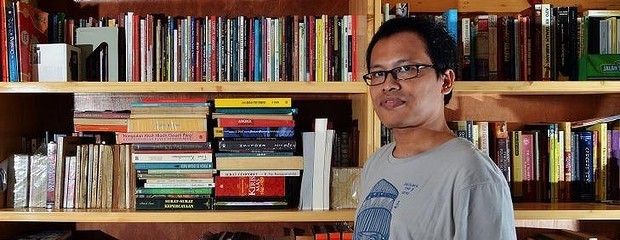Since joining the Pontas Agency in June 2015, Eka Kurniawan has become an unstoppable rising star of Indonesian literature. His novel Beauty is a Wound was first published in English in the United States late last year by New Directions and in Australia and South East Asia by Text Publishing. Within 2015 it has received global critical acclaim, including praise from The New York Times, Financial Times and The Guardian, among many others. Beauty is a Wound is being translated into 28 languages (you can see the full list of international publishers here) and film producers have already shown interest and discussions about a film adaptation have started. The novel was included in eight “Books of the Year 2015” lists.
 Recently a wonderful new profile of Eka Kurniawan was the lead story in the “Arts & Books” section of the Economist, which you can read here. The article is a delightful discussion of Eka Kurniawan’s individual style and the distinct qualities of his novels: «If [Pramoedya] was the nation’s Zola, Mr. Eka is shaping up to be its Murakami: approaching social concerns at an angle rather than head-on, with hefty doses of surrealism and wry humour.»
Recently a wonderful new profile of Eka Kurniawan was the lead story in the “Arts & Books” section of the Economist, which you can read here. The article is a delightful discussion of Eka Kurniawan’s individual style and the distinct qualities of his novels: «If [Pramoedya] was the nation’s Zola, Mr. Eka is shaping up to be its Murakami: approaching social concerns at an angle rather than head-on, with hefty doses of surrealism and wry humour.»
Highly praised, here are some of the quotes from literary critics and journalists on Eka Kurniawan’s debut novel Beauty is a Wound:
The New York Review of Books: «Kurniawan, born ten years after the massacres, is in many ways a literary child of Günter Grass, Gabriel García Márquez, and Salman Rushdie.»
Le Monde: «Original and powerful… Maybe, who knows, the judges of the Nobel Prize could, in a few years, consider giving [Eka] the prize that Indonesia has never received? »
The New Yorker: «An arresting portrait of Indonesia’s struggle for nationhood’ and a ‘satire’ with ‘a sense of humor that emerges even when he writes about the hundreds of thousands of people killed in the anti-Communist purge, of 1965…Despite its darkness, the book is playful and spirited, paying homage to the Indonesian form of wayang, or shadow puppetry, which is often used in the retelling of Hindu epics, such as the Ramayana and Mahabharata.»
The New York Times: «Set during the singularly tumultuous period from just before World War II through most of the rest of the 20th century, the book pulls off the bold feat of telling Dewi Ayu’s family history while also telling Indonesia’s in a way that doesn’t seem heavy-handed or forced…[T]his is an impressive, accomplished book. Gracefully translated by Annie Tucker, the writing is evocative and muscular, with particularly spicy descriptions and some good wry humor.»
English language rights of his new novel, Love and Vengeance, have been sold to Pushkin in the UK (who also acquired rights for Beauty is a Wound), New Directions in North America and Text in ANZ. All translation rights are available.
More information: Jessica Craig
